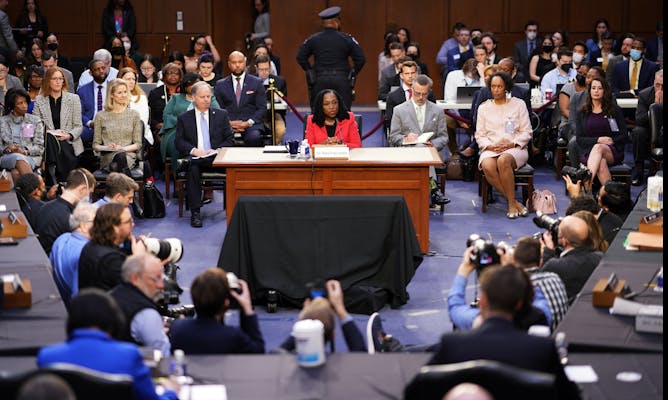|
|
|
|
Supreme Court nominee Ketanji Brown Jackson – set to become the first Black woman to sit on the bench – will wrap up her Senate Judiciary Committee confirmation hearing today. It follows three long days of intensive questioning, mostly by Republican senators.
Some 55 years earlier, Thurgood Marshall, the first Black Supreme Court Justice, had to endure a similarly testing process.
The similarities between the hearings of Jackson and Marshall – specifically, a shared focus by questioners on crime and race – are unmistakable, constitutional law scholar Margaret M. Russell writes.
“In all likelihood, Jackson will become the next justice of the U.S. Supreme Court, representing another momentous step forward for this country. But it is also another reminder that transformative change on race, while continuing to progress, happens slowly in the U.S.,” Russell explains.
Also today:
|

|
Amy Lieberman
Politics + Society Editor
|
|

Ketanji Brown Jackson, speaking during her confirmation hearing on March 22, 2022, would be the first Black woman to serve on the court.
Doug Mills-Pool/Getty Images
Margaret M. Russell, Santa Clara University
55 years after Thurgood Marshall testified during his Supreme Court confirmation hearing, Judge Ketanji Brown Jackson’s hearings show race and crime continue to drive questions about a Black jurist.
|
Environment + Energy
|
-
Jay L. Zagorsky, Boston University; Erich Muehlegger, University of California, Davis; Sanya Carley, Indiana University; Theodore J. Kury, University of Florida
Consumers are feeling pain at the pump and demanding solutions. Some politicians are pushing gasoline tax waivers – but that means less money to fix roads, and often not much economic relief.
-
Ernest Agee, Purdue University
Studies show tornadoes are getting more common and more intense, and they’re shifting eastward to a new tornado hot spot.
|
|
Politics + Society
|
-
Peter Harris, Colorado State University
Former Secretary of State Madeleine Albright has died at age 84. But many of the foreign policy concepts she helped bring to the post-Cold War world remain.
-
Mia Bloom, Georgia State University; Sophia Moskalenko, Georgia State University
The Russian army has fared poorly and the Ukrainian military has fared well, defying experts’ predictions about the war in Ukraine. Can children’s fairy tales help explain the difference?
|
|
Economy + Business
|
-
Sam C. Ehrlich, Boise State University; Neal Ternes, Arkansas State University
States and universities have passed many rules governing what types of name, image and likeness deals athletes can sign. Most are innocuous, but three may violate their First Amendment rights.
|
|
Science + Technology
|
-
Stephen Jacobs, Rochester Institute of Technology
Starting in 2023, all research proposals funded by the NIH will need to include a data sharing and management plan. An expert on open science explains the requirements and how they might improve science.
-
Andrea Vial, New York University Abu Dhabi
A focus on raw intellectual talent may unintentionally create a cutthroat workplace culture. New research suggests women’s preference to avoid that environment may contribute to gender gaps in some fields.
|
|
|
|
Arts + Culture
|
-
Nancy Haskell, University of Dayton
A recent study found that an unexpected run in the NCAA men’s basketball tournament can boost enrollment.
|
|
|
|
Today's graphic |
|---|
| |
More from The Conversation US |
|---|
|
|
|
| |
| |
| |
| |
|
|
|
|
|
|
|